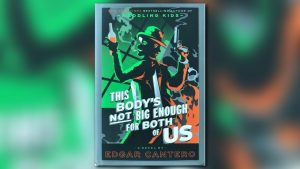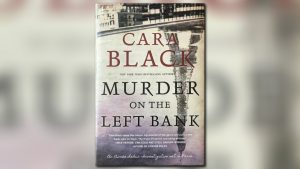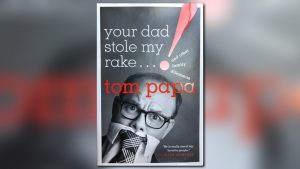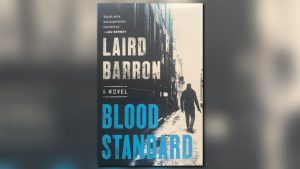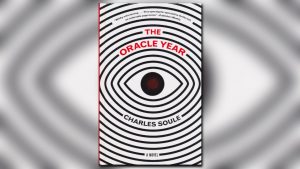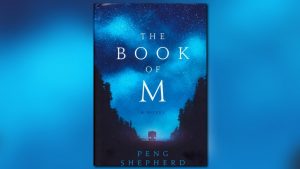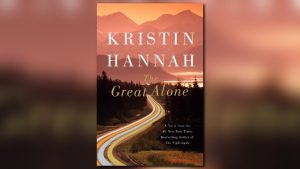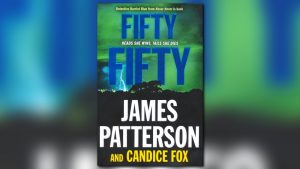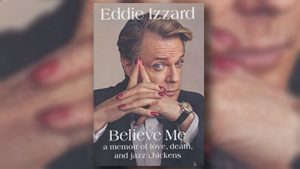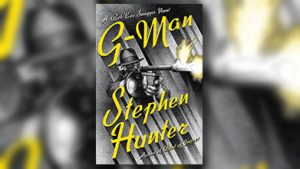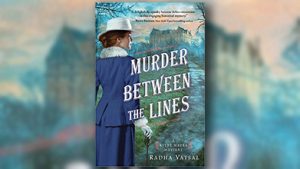The Love Slave is set in New York City in 1995.
It details the lives of three young people trying to find their way through life in the big city.
Thirty year old Sybil Weatherfield is an office temp and the main character in this story.
When she isn’t at her day job, Sybil writes a confessional column for the “New York Shock.” Sybil has two main friends in The Love Slave; a paper pusher for a human rights organization and a lead singer for a rock band called “Glass Half Empty.” Together they search for something that matters in life.
The Love Slave defines what it means to be completely and entirely captivated by the idea of something more.
NARRATOR: "Books & Co." is made possible by the Virginia G. Piper Center for Creative Writing, serving writers and readers in the Phoenix metropolitan area, the state of Arizona, and the world.
ALBERTO RIOS: Welcome to "Books & Co." I'm your host, Alberto Rios; we're joined today by Jennifer Spiegel, who has written both a novel and a book of short stories recently. They are "Love Slave," a novel, published by Unbridled books, and "The Freak Chronicles," published by Dzanc books. They are a collection of short stories. Jennifer, welcome, I can't wait to talk about --
JENNIFER SPIEGEL: Thank you.
ALBERTO RIOS: To talk about these books.
JENNIFER SPIEGEL: I'm excited too.
ALBERTO RIOS: When I was reading these, first thing way is struck by was the different genres, writing stories that are so wildly different from each other and wildly different geographically, and this one story that is so placed in New York City. We will start with "Love Slave," if that is all right.
JENNIFER SPIEGEL: Okay.
ALBERTO RIOS: Which is all New York, Why?
JENNIFER SPIEGEL: Why. I think partly -- I have always thought that people, when I was young, they were either drawn to the west coast or east coast. Sort of their own promise land when you are a young person growing up. For me it was definitely New York City. I did go to graduate school there for another degree. I went -- I got my master's in PoliSci there at NYU. Worked there for a number of years. Really wanting to be a writer, and I think "Love Slave" came out of that experience. I wrote it actually once I left New York City, which most writers do, they write about thinks after they're done with the experience. However, it was in many respects a tribute to New York, as well as to my experiences there. And I just still -- I wanted to be a -- I wanted it to be a New York novel. I would like for it to be categorized as a New York novel.
ALBERTO RIOS: Which it is. But in an extraordinary way. And the main character, as she goes through her days, Sybil -- she says something interesting about New York. Everything on the outside is what is going on on the inside. And yet she has this existence that is all about temporariness.
JENNIFER SPIEGEL: Uh-hmm.
ALBERTO RIOS: She has that other great line, I temp, therefore New York is. So, she is connected to this city, but it is all fast movements and maybe not fulfilling. She wrestles with that. What do you think she is looking for? It is no different from probably what anybody else is looking for, although it may be --
JENNIFER SPIEGEL: You think it is.
ALBERTO RIOS: I do.
JENNIFER SPIEGEL: I'm curious to know what you think is --
ALBERTO RIOS: I will jump right in. Whoever he is, he looks how you want New York to look in a man. And then she talks about a man -- she is looking for something that maybe somebody else is not exactly looking for. But she has her own ideas.
JENNIFER SPIEGEL: I think she has this idea that there is this certain freakiness that is present in New York City that is embodied there that she can capture, heat of the moment, which it is just constant excitement for her. I also think, though, that New York City in my limited experience, you go there to connect with people, oftentimes, that are like you, but it is really hard to meet them because they're all doing their own thing. The expectation is that there is more people like you. However, the reality is that the -- the life-style doesn't really permit that you do connect with these people. And I think that she suffers from that disjuncture, external versus the internal. And that is kind of embodied in her loneliness, perhaps. She is very lonely for an ideal that she can't really get her hands on in New York City, if that makes any sense.
ALBERTO RIOS: No, it does. She curiously inhabits that moment in a way that is self-generative, that is to say, even when she is going out, she is going out to listen to a band that is going to be very loud.
JENNIFER SPIEGEL: Uh-hmm.
ALBERTO RIOS: So, she can't talk to anybody. She can't grab hold of anything. She finds one friend, and they have a lot in common, but a lot that is not in common, as you sort of read through the book, they seem fast friends at first but they have wildly divergent ideals of what they want to do in their lives.
JENNIFER SPIEGEL: Perhaps, this is probably -- the idea of the failure to find intimacy and maybe this is a reaching out, attempting to get intimacy with people. And I think that Madeline, for example, the character that you are speaking of --
ALBERTO RIOS: Madeline Blue.
JENNIFER SPIEGEL: Madeline Blue, with Joni Mitchell echoes.
ALBERTO RIOS: Yes.
JENNIFER SPIEGEL: They both want friends. Even though they're very divergent and different, they both want to be friends, however, they -- it is -- they're just missing each other. I think that that is ultimately Sybil finds that that intimacy with Madeline is not going to be present, and that is kind of the way it is in the entire book, perhaps, with the characters that she meets. And that is really present in the -- "The Freak Chronicles," I think.
ALBERTO RIOS: New York City great search to be itself, and maybe finding it, maybe not. She has this job as a temp, always frenetic, always different, always something else, never the same thing. So, when you talk about the freakiness or -- we will talk about that word freak, it's that search for difference or that fear of same. And what do you think about that? I mean, she just -- is she just scared -- she is looking for it. She is looking for it. But if she were to ever find it, it wouldn't be different the longer she stayed with it.
JENNIFER SPIEGEL: You know, I wonder if that is just something I'm interested in or -- the idea of avoiding the normalcy of life, and Sybil has that, resists settling down. However, there is a cost when you don't settle down and that is what she is really struggling with in her relationships, but --
ALBERTO RIOS: What I find so curious about that dynamic. It is a complex character. She is a wonderful study. I don't know if we end up liking her or not liking her but we recognize the impulse --
JENNIFER SPIEGEL: You don't like her --
ALBERTO RIOS: Well, I don't know. I spent all of that time with her and I think that defines myself of liking her, but I don't know. If her fear of settling down and all of that sort of stuff, it doesn't turn around and mean that she is going to, for example, immediately sleep with this band member that she suddenly met and is spending time with. That actually starts to take longer and longer, and become not quite settling down, but not fast, not frenetic --
JENNIFER SPIEGEL: No.
ALBERTO RIOS: And that's a counterintuitive --
JENNIFER SPIEGEL: I don't know if humans can really exist always resisting commitment and settling down. I don't know if we can really live that way.
ALBERTO RIOS: And she starts to sense that. And so she is always searching for what she finds and she is not sure it is what it is, and that is the other part of that. Once we find what we think we are looking for, we don't know that the other person is going to agree --
JENNIFER SPIEGEL: Right.
ALBERTO RIOS: So she struggles with that.
JENNIFER SPIEGEL: Right.
ALBERTO RIOS: A dark side to all of that is she has some body issues, and purging issues. And there is this -- it is just a tough line. I just love this. When you say, I've etched men's name into my skin with razor blades, when Rick heals, all right Mike. I -- I thought that is -- that is a tough line. When Rick heals, I will write Mike. And she probably means it.
JENNIFER SPIEGEL: Yes --
ALBERTO RIOS: At that point. And she later, you know, she always bingeing and purging and so she has got these interesting body issues that follow her around. And she later makes a promise to stop some of that. But we don't know if she is going to be able to keep it.
JENNIFER SPIEGEL: No, simplistic solution. She does kind of stop, but those are things that haunt somebody. And the -- and the stray ends before she deals with that.
ALBERTO RIOS: We don't end up actually knowing.
JENNIFER SPIEGEL: What about this idea of her being just a tough guy?
ALBERTO RIOS: Her being tough?
JENNIFER SPIEGEL: Yeah.
ALBERTO RIOS: I mean, is that -- is that a sign of toughness or is it -- an odd or skewed tenderness?
JENNIFER SPIEGEL: I think it is tenderness. I do. I think it is a -- it is a -- a toughness towards yourself. Hardening of yourself, but I think ultimately, it speaks of trashing yourself, and hurting yourself and if you -- it is even beyond just bingeing and purging. She has a real obsession with physical appearance, and the way people look and the whole supermodel phenomenon, which was huge in New York City in the 90s. I don't know how it is right now. But that was the time when I -- when I -- I --
ALBERTO RIOS: In the 90s.
JENNIFER SPIEGEL: Set in 1995. And that was a time when the -- I lived in New York City in 1995. It was like Naomi Campbell and Kate Moss and they were everywhere turned.
ALBERTO RIOS: Looked at them sideways and they disappeared.
JENNIFER SPIEGEL: Right, exactly. I don't know how I was outside of New York City. I remember being inundated with the presence of physical beauty. The cafe --
ALBERTO RIOS: I have read about it.
JENNIFER SPIEGEL: Russian Model Cafe. And all of these normal people that were trudging the streets of New York City, and Sybil was one of those and I think she struggles with physical beauty. She doesn't measure up. Ultimately it -- I don't -- very tough.
ALBERTO RIOS: Let's just take a moment to remind our viewers that you are watching "Books & Co," I'm your host, Alberto Rios and we're joined by Jennifer Spiegel, talking about two of her books, "Love Slave" and "The Freak Chronicles." Let's jump over to "The Freak Chronicles" for a minute. The first book, "Love Slave," so centered in New York the "The Freak Chronicles" is everywhere. Specifically Africa. And sometimes just exquisitely beautiful ways in ways that we had this frenetic -- frenetic -- the pace is so different in all of the stories, but specifically when you are talking about things like that. What did you think about? How did that happen? We were so focused in one thing and we stuck with it so long and suddenly like a fire cracker exploding all of these stories and places and foods and scents and colors.
JENNIFER SPIEGEL: Both speak to my interest in geography and travel. Interestingly enough, "Love Slave" was written mostly before "The Freak Chronicles." The revision came afterwards. What you see has been heavily revised and that has been afterward. The stories actually followed and I went to Africa myself after I was in New York City. So, there is a difference in maybe how I was writing and then seeing things.
ALBERTO RIOS: I wondered if you had been to Africa -- you almost have to have been.
JENNIFER SPIEGEL: I have.
ALBERTO RIOS: Given the level of detail that you come up with here. So much of it has to do also with South Africa, specifically. Is that where you --
JENNIFER SPIEGEL: I was in South Africa. And I envy those writers very much who have not spent time in places and writes in incredibly great pose.
ALBERTO RIOS: You painted these -- never traveled.
JENNIFER SPIEGEL: It is amazing.
ALBERTO RIOS: But you did travel, and you brought back all kinds of things. What I loved is that push forward in New York City, that pushing. Always, you know, you were either -- you were fighting against the noise and the thing or you were pushing and trying to find your place. And the movement, as you describe it later, and you have this wonderful passage. Ginger held on to the kelp and allowed her body to be pushed and pulled by its movement within the water. Okay. She pulled herself vine to vine, held her breath to go under to pull her own body down to claim seaweed and inverted Jack in the bean stock. Up, down. And in a curious way, that is Africa.
JENNIFER SPIEGEL: It is.
ALBERTO RIOS: Especially relative to New York.
JENNIFER SPIEGEL: It is. Yeah, they're very different.
ALBERTO RIOS: Very different.
JENNIFER SPIEGEL: And I thought the way to be happy in Africa, you might climb to the top in New York, but the African movement, as you describe it, is to climb the mirror opposite, climb down there to see what is there. What do you think is down there? So many characters and a lot to report and a lot of traveling and a lot of movement.
JENNIFER SPIEGEL: There is. Interestingly though, I think all of the characters are Americans living abroad and that is an interesting combination. Taking one's American sensibility and placing it elsewhere, it shakes you up. I think there is a lot of mythologies drawn in world traveler, just the idea that it brings you wisdom or a certain sort of global understanding. It does do that. But not to the extent perhaps that we think it does. Most of the characters in there cannot escape their American identity. They carry it with them where they go in Africa. South Africa, a time that a lot of these stories are set, South Africa was in a really interesting political -- Nelson Mandela had just become the president. I will get into politics. That is my second love. Apartheid had just ended. And American --
ALBERTO RIOS: Are you talking about the new --
JENNIFER SPIEGEL: It was new, apartheid dismantled and the first time in its history that there is a black president. American do-gooders going over there, and they have a lot of judgment about South Africa in particular and the way they have run things and at the same time they don't know it. I think that -- Ginger is a good one. She works for the truth and reconciliation committee, which Desmond Tutu is running at the time, crimes against humanity -- and she is very judgmental, in truth, her own world failures. That happens a lot when you are in that international setting; you come up against yourself rather than all of the demons of the bad place that you are at. Because suddenly you -- it is contextualized and people are human and you realize that it is not the other that is necessarily -- it is your own moral behaviors that is not coming up as it should.
ALBERTO RIOS: One of the things I appreciate about both books is that you reach that political level by not going there. You talk about the everyday of these lives --
JENNIFER SPIEGEL: Love politics.
ALBERTO RIOS: Well, but you -- this -- negate the politics. What you do is you find it on an everyday level. Lunch on Thursday afternoon, at that level. What is the politics of eating lunch on that day -- and I think that is what these stories explore.
JENNIFER SPIEGEL: Well, I mean, I think -- I could get into just a little bit why -- for me, I did go into politics and international politics in particular out of an interest in humanitarian efforts and wanting to work in human rights, and one thing I found, I never by the way -- I don't want to make it sound like I -- I never did, but I always felt when I was working that there was this -- a lot of rhetoric and -- and I did shift very deliberately to the arts. I felt that there was a -- it was more effective to talk about humans and how they function in the world and that is what I would like. Sybil is a product of the Reagan area, live aid, amnesty international, and good things in some regards, however, living a real life and how do you really behave when you are confronted on the homeless man on the street who hasn't eaten but he smells like whiskey. As my characters in "The Freak Chronicles," abroad, the fact the girls are discriminated against, when in reality, you are an individual who is throwing out money and you have to figure out the morality of your wealth. If that makes sense.
ALBERTO RIOS: No, it does. It does. And in that sense, it is like her partner character, her friend Madeline, it is Madeline that we see take off in the end and it is sort of Madeline in a -- different facets of her trying to save the world. That is her want. Or she is looking at the world. Something bigger than whatever it was that was surrounding her. For Sybil it was all New York City, center of the universe, and Madeline is helping us see -- not all Madeline, all different characters, but they have that aspect of her. But I think -- the last story in the book is about settling down -- it is the one that ends up being -- let's see what it is called. And it has the wonderful line, what I think in a lot of ways speaks to everything that you have been writing about in both books, and it is just a very simple planning of a wedding. And the character says, and just the presence of the dead father, that's what she wants, but there is this great line, the presence of an absence. And that seems -- what is happening in many of the books. Such a presence of the absence. There is that search for something because you feel that absence, but you don't let the absence itself be -- you are trying to solve it. But I loved that line. It felt like it was right in the right place. But it was a nice line. Did you think through that line when you wrote it or was it casual? It came across very casually and I love that it did. It wasn't trying to be more than it was. It was -- it was --
JENNIFER SPIEGEL: You know, I think the line itself was probably somewhat accidental. I -- the idea, presence of the absence is not. And that is really -- I would like for my books to be larger than the moment and just speak of philosophical needs and desire for meaning. I'm not going to say the -- I believe that my characters are constantly haunted by that need for meaning. And that presence, absence may be found there.
ALBERTO RIOS: You have in one of the stories this exploration of the moment, which is the opposite of the search for an ending. It is the wonderful line, removal -- dismissal of significance from action. The denial of truth, arms thrown around strangers. Take me today only.
JENNIFER SPIEGEL: One-night stand by the way.
ALBERTO RIOS: That's it. But it is not the story. That is not what everything becomes.
JENNIFER SPIEGEL: No, she can't -- I think the character finds that one-night stand doesn't work for her. She can't do it. That take me right now only is not sustainable for her.
ALBERTO RIOS: Not sustainable for her or any of the characters in any of the books.
JENNIFER SPIEGEL: No, it doesn't work for my characters.
ALBERTO RIOS: And that is I think a little bit of a -- the books, you might think that is what you are going into but it is not the case at all.
JENNIFER SPIEGEL: That is a good thing to pull out. I want to emphasize that. I think that my characters, New York, the fleetingness of the whole experience or the search for love and casual sex -- there is casual sex in my books, they -- they can't live with it. And that ultimately is like meaninglessness and my characters can't live with it and I think that may be the big over-arching thing.
ALBERTO RIOS: Pretty intriguing. We can talk about this wonderful -- when you talk about Africa is only poetic. Do you remember that?
JENNIFER SPIEGEL: I do.
ALBERTO RIOS: Can you talk a little bit about that? You go on to say, panoramas poetic, poverty and politics poetic, undeniable, and then you say Africa is one great big Shakespearean tragedy --
JENNIFER SPIEGEL: Very specifically of South Africa, because I haven't been to other places in Africa.
ALBERTO RIOS: We should be careful to say, right?
JENNIFER SPIEGEL: Yeah. And my stories are set in South Africa. But I think South Africa is truly was just a place to be a writer in. Because it was white and black, politics are so messed up. It is beautiful. Breathtakingly beautiful. I don't know if you have ever seen pictures of -- there is cascading clouds that just roll off, the oceans, two oceans meet. It is really just unbelievable beauty and amidst severe human strife. To set a story there, juxtaposes to everything that -- it is Shakespearean. It is also -- it is -- it evokes poet -- it gave me an opportunity probably to really play around with language.
ALBERTO RIOS: Well said and well shown. I think you do it in these books.
JENNIFER SPIEGEL: Thank you
ALBERTO RIOS: I want to thank you for joining us today.
JENNIFER SPIEGEL: Thank you.
ALBERTO RIOS: I want to thank you, viewers, for watching "Books & Co," I'm Alberto Rios, we have been joined by Jennifer Spiegel talking about her two books. "Love Slave" and "The Freak Chronicles." Join us next time when we will be bringing you another good book.





